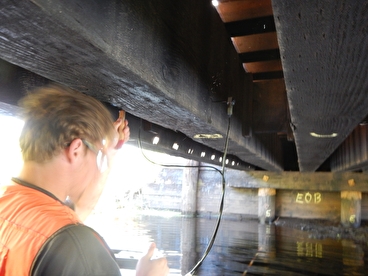
These FHWA online courses are designed for a variety of professionals working within local agencies and tribal governments. Topics covered include inspecting and maintaining bridges; performing land use surveys; planning and implementing erosion and sediment control devices; and inspecting, installing, and maintaining pipe structures or systems.
Course Descriptions and Registration
You can take any or all of the four courses in the series, in whichever order you prefer. All courses are free.
Expand the sections below to see detailed information and register for each course.
Bridge Maintenance
Course Description
Regular bridge inspections are both critical and required. This course will provide you the foundational information you need to ensure that your local bridges are safe. You’ll review how to conduct regular inspections and then fix any items that reduce successful operation of the structure.
Who Should Take This Course
Professionals in a variety of positions within local agencies and tribal governments who are responsible for inspecting and maintaining bridges, as well as those who plan and schedule those inspections and maintenance activities.
Credit
3.0 PDHs.
Elevation and Grade Instruments and Use
Course Description
Before starting construction on any project, surveying the land to determine the exact parameters of the natural environment is key. This course covers the types of surveys you may encounter, elevations and the types of surveys that use elevations, and an overview of surveying equipment and tools.
Who Should Take This Course
Professionals in a variety of positions within local agencies and tribal governments, with an emphasis on those who are performing and involved with different types of land use surveys.
Credit
0.5 Roads Scholar Program Maintenance Certificate credit and 3.0 PDHs.
Installation and Maintenance of Erosion Control Devices
Course Description
Proper planning of construction site activities greatly reduces the impact of pollution and soil disturbance activities on nearby resources, limiting the amount of sediment that is carried into lakes, streams, and rivers by stormwater runoff. This course covers widely used types of erosion control measures and sedimentation prevention and management practices.
Who Should Take This Course
Professionals in a variety of positions within local agencies and tribal governments, focusing on those who handle the planning and implementation of erosion and sediment control devices.
Credit
0.5 Roads Scholar Program Maintenance Certificate credit and 3.0 PDHs.
Pipe Installation and Maintenance
Course Description
The main purpose of roadway drainage pipes is to properly drain stormwater. Without proper drainage, water can build up and lead to flooding, structural damage, soil erosion, and other issues. This course will review pipe installation procedures, joint classification and function, and pipe and culvert maintenance.
Who Should Take This Course
Professionals in a variety of positions within local agencies and tribal governments, focusing on those who inspect, install, and maintain pipe structures or systems.
Credit
0.5 Roads Scholar Program Maintenance Certificate credit and 3.0 PDHs.
Accessing the Courses
This training is offered via the course management system Canvas. Upon completing your online registration for each course, you will receive an email confirmation. To access the courses, please visit Canvas and log in with your University of Minnesota internet ID and password. Once you have been enrolled, the courses will appear on your Canvas dashboard.
If for any reason you do not have access to the courses after enrolling, please contact Katherine Stanley at sell0146@umn.edu for assistance.
Technical Requirements
Because it's built using web standards, Canvas runs on Windows, Mac, Linux, iOS, Android, or any other device with a modern web browser. Chrome, Firefox, Safari, and Internet Explorer work best for these courses.
Credit
- To earn the Roads Scholar Program Maintenance Certificate credit, students are required to send a copy of the course completion certificate to mnltap@umn.edu.
- For more information on PDHs and the continuing education requirements for professionals as outlined in Minnesota Statute 326.107, see the Minnesota Board of AELSLAGID website.
More Information
For more information, please contact mnltap@umn.edu.
Sponsors
These courses are sponsored by Minnesota LTAP at the University of Minnesota. Minnesota LTAP is sponsored by the Minnesota Local Road Research Board (LRRB) and the Federal Highway Administration (FHWA).
Course curriculum was developed and compiled by the FHWA Center for Local Aid Support in conjunction with a technical advisory panel of experts including representatives from local agencies and state DOTs.